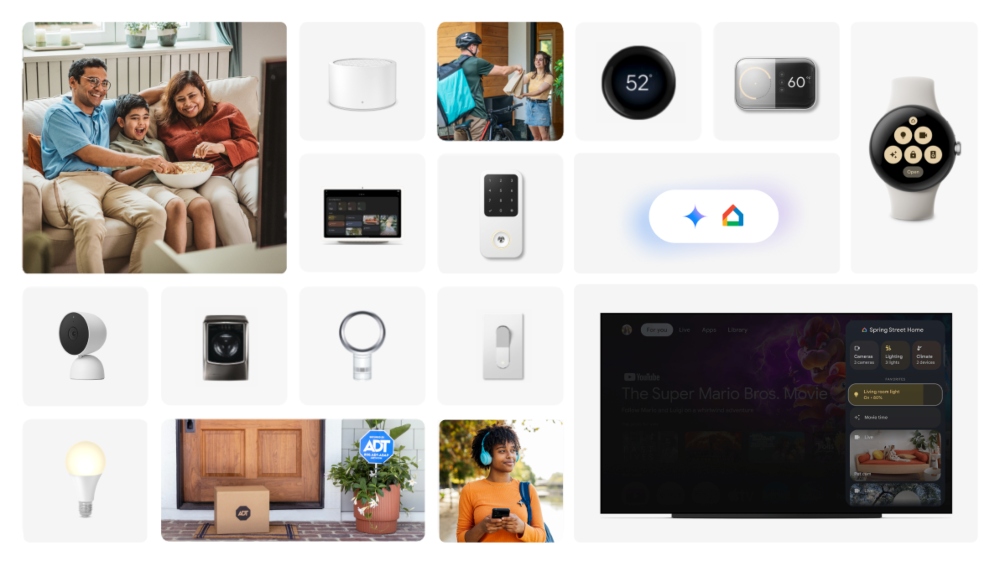Google’s I/O developer conference was last week and the big takeaway for those who didn’t tune in was: AI. AI in search, AI in videos, AI in near everything. That also means, AI in the home, and Google had a bit to dish on how Gemini is going to be incorporated into its smart home offerings as well.
Last year, Google opened its Home APIs to developers looking to create bespoke integrations with Google Home, and that netted some interesting applications from both ADT and Eve, as well as Hisense in more recent times.
Related News: Hisense Integrates Google APIs into Its Smart Home ConnectLife App
Giving a peak behind the scenes, Google has also announced that new integrations with popular smart home companies such as Yale, Cync and First Alert are on the horizon.
At Google I/O 2025, however, the company stated that it will be directly incorporating its Gemini AI into its Home APIs soon, thereby “bringing the best of Google’s AI” directly to homeowners.
Gemini Home AI Fast Becoming a Reality
Back in November 2024, Google showcased a limited application of Gemini’s potential to become an automation creation tool by opening it up to select Nest Aware Plus subscribers.
Using ‘Help Me Create,’ users could request bespoke automations for their Nest systems via voice, and the system would create an automation based off their request.
Now, that capability is expanding across the home platform, though it’s not yet ready for full deployment, according to Google.
By incorporating the Gemini AI into its Home platform, Google is aiming to make it simple for homeowners to build their own custom automations, without the need of any programming knowledge.
The idea is not too dissimilar from what smart home company Nice is doing with its own AI voice assistant. Released last year on its NiceOS 8.9 update, the company has stated the goal of using AI in its systems is to simplify automation for the homeowner.
According to Nice, it views the simplification of automation creation as a boon to integrators, minimizing service calls to fine-tune existing automations and also minimizing the programming knowledge required to design bespoke smart home systems on its platform.
Integrated into Google Home, Gemini will reportedly analyze home devices and usage patterns to then offer automations it can develop for the homeowner. Additionally, Gemini, much like in the initial Nest debut, users can converse with Gemini to create their own automations based off personal requests.
Google has also stated that Gemini’s integration into the Home platform will allow for more contextual automations as well, such as forgoing turning on the sprinklers if it happened to have rained the day prior.
Simpler Smart Home Automations a Goal Across Both Pro and DIY Channels
While still new in the grand scheme of things, the professional smart home channel has still had at least some exposure to this type of automation development.
Nice’s voice assistant has been available to CE pros for roughly seven months at this point, while Josh.ai, ever the pioneer when it comes to AI control, has been leveraging contextual AI models in its control system since 2023.
Where Google differs from Nice and Josh, however, is in its core audience, as while Google does interact with the professional space from time to time, the Home platform remains largely popular within the DIY segment of the smart home market.
Gemini’s integration into Google Home will also expand access to the platform across a wide variety of devices such as connected smart speakers, smart displays and Google TV, turning some of the most widely-used electronics in the home into control interfaces for the Google Home platform.
Though this could be viewed as a ‘catching up’ to professional capabilities in Google’s corner, the progress being made here also highlights how powerful AI is at democratizing technology, taking these exceptionally powerful features, once reserved for higher-end systems, and lowering the barrier of entry and cost for the average homeowner.
Though to the extent to which Gemini will be able to match the capabilities of these more sophisticated systems is yet to be seen. For those looking to toy with the new APIs themselves, Google is opening the doors to anyone who wants to sign up to its Developer Newsletter.






